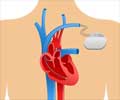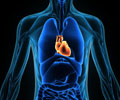Study examines changes in the spleen and kidney that occur simultaneously during heart attacks.

‘With changes in heart function, definite histological and cellular changes in the spleen, and bimodal inflammatory responses in kidney was observed in mice.’





Why? Because the three organs are linked in the disease process. The spleen, which is 4 inches long and sits in the upper abdomen, acts as a reservoir of immune cells that speed to the site of heart injury after a heart attack to begin clearance of damaged tissue. Those leukocytes can lead to either heart protection or pathology, depending on how the immune response progresses.
In turn, the injury in the heart muscle after a heart attack develops a progressive signal that triggers structural pathology and complications in the kidneys, which can affect survival in heart attack patients.
Halade, who uses a mouse heart attack model to research ways to prevent heart failure, has now published a functional and structural compendium of the simultaneous changes taking place in the heart, spleen and kidneys in mice during the period of acute heart failure immediately following a heart attack and during the longer period of chronic heart failure that comes next. Such a systems biology study of heart-spleen and heart-kidney networks, also known as the cardiosplenic and cardiorenal networks, will be essential to developing novel treatments for chronic heart failure, says Halade, an assistant professor, UAB Department of Medicine and UAB Division of Cardiovascular Medicine.
In a study in the American Journal of Physiology-Heart and Circulatory Physiology, Halade and colleagues looked at functional and structural changes of the three organs at four time points: one day and five days after heart attack, which is the acute heart failure period in the mouse model, and 28 days and 56 days after heart attack, which is the chronic heart failure period. Fifty-six days after a heart attack for mice translates to about 10 years after a heart attack for humans.
Advertisement
In correlation with changes in heart function, the UAB researchers found definite histological and cellular changes in the spleen, and they also found bimodal inflammatory responses in kidney inflammatory biomarkers. In the left ventricle of the heart, there was a unidirectional, progressive and irreversible deposition of compact collagen, along with dynamic changes in the cardiosplenic and cardiorenal networks following the heart attack.
Advertisement
Source-Eurekalert















